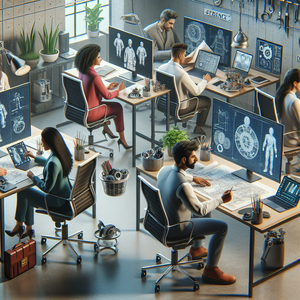The Future of Freelance Mechanical Engineering: Trends to Watch

One of the most impactful trends in mechanical engineering is the integration of automation and artificial intelligence (AI). These technologies are revolutionizing workflows, enhancing productivity, and increasing precision in engineering tasks. Freelance mechanical engineers can harness AI-driven design software and automation tools to optimize their workflows, resulting in higher-quality outputs and faster project completion times. Take, for instance, modern CAD (Computer-Aided Design) software, which now integrates AI capabilities that suggest design improvements based on user input and historical data. Freelancers who familiarize themselves with these tools not only increase their efficiency but also elevate their marketability. By positioning themselves as adept users of cutting-edge technologies, freelancers can attract clients seeking innovative and effective solutions.
Remote Collaboration Tools
The COVID-19 pandemic has fundamentally altered how we work, and the trend toward remote collaboration is here to stay. For freelance mechanical engineers, this shift means access to a broader, global client base and the opportunity to collaborate with diverse teams from across the world. Essential tools like Zoom, Slack, and Trello have become staples for managing projects and maintaining communication. To fully leverage this trend, freelancers should invest time in mastering these communication and project management tools. Establishing a strong online presence through platforms like LinkedIn can also be beneficial. By showcasing their expertise and building a comprehensive portfolio, freelancers can effectively attract international clients and opportunities.
Emphasis on Sustainable Practices
With environmental sustainability becoming a priority across industries, the demand for sustainable engineering practices is on the rise. Freelance mechanical engineers who specialize in sustainable design and green engineering solutions are positioned to tap into a lucrative and growing market. This trend is driven by increasing regulatory requirements and a consumer shift toward environmentally friendly products. Mechanical engineers can enhance their expertise by pursuing certifications in sustainable design and familiarizing themselves with eco-friendly materials and technologies. By branding themselves as experts in sustainability, freelancers can carve out a niche that not only benefits the environment but also presents significant business opportunities.
The Importance of Continuous Learning
In a fast-evolving industry, continuous learning is crucial for freelancers to maintain a competitive edge. The emergence of new technologies and methodologies demands a commitment to ongoing professional development. Freelancers can take advantage of online courses, webinars, and industry conferences to stay current with the latest advancements in mechanical engineering. Actively seeking educational opportunities relevant to their specific areas of focus allows freelancers to enhance their service offerings and provide greater value to clients. By investing in their education, mechanical engineers can position themselves as knowledgeable and adaptable professionals in a rapidly changing landscape.
The future of freelance mechanical engineering is full of promise, characterized by trends that present both challenges and opportunities. By embracing automation and AI, leveraging remote collaboration tools, emphasizing sustainability, and committing to continuous learning, freelance mechanical engineers can position themselves for success in this dynamic environment. As the industry continues to adapt to new technologies and evolving market demands, proactive and adaptable freelancers will thrive, forging their own paths in the world of freelance engineering. Success lies in the ability to be forward-thinking and responsive to the changing needs of clients and the broader engineering landscape.
Freelance Sustainable Design Engineer
Environmental consulting firms, renewable energy companies, construction firms
Core Responsibilities
Develop and implement sustainable engineering solutions for various projects, focusing on eco-friendly materials and energy-efficient designs.
Conduct assessments and analyses to ensure compliance with environmental regulations and sustainability standards.
Required Skills
Strong knowledge of sustainable design principles and practices, including certifications in green engineering.
Proficiency in software tools for environmental impact analysis and modeling (e.g., SimaPro, EnergyPlus).
Mechanical CAD Specialist
Manufacturing companies, product design firms, engineering consultancies
Core Responsibilities
Create detailed CAD models and engineering drawings for mechanical components and assemblies using advanced CAD software.
Collaborate with clients to understand project requirements and provide design solutions that meet specifications.
Required Skills
Expertise in CAD software (e.g., Autodesk Inventor, SolidWorks) and familiarity with AI-powered design tools.
Strong attention to detail and ability to troubleshoot design issues effectively.
Remote Project Manager for Mechanical Engineering
Engineering firms, technology companies, freelance platforms
Core Responsibilities
Oversee engineering projects from concept to completion, ensuring timely delivery and adherence to budgets.
Facilitate communication between remote teams and clients, managing project updates and stakeholder expectations.
Required Skills
Proficient in project management software (e.g., Asana, Trello) and remote collaboration tools (e.g., Zoom, Slack).
Strong organizational and leadership skills, with the ability to manage multiple projects simultaneously.
Automation and Robotics Engineer
Manufacturing corporations, robotics startups, R&D departments
Core Responsibilities
Design, develop, and implement automated systems and robotics solutions for manufacturing processes.
Analyze system performance and troubleshoot issues to enhance efficiency and productivity.
Required Skills
Solid understanding of robotics programming languages (e.g., Python, C++) and automation software (e.g., PLC programming).
Experience with AI and machine learning applications in engineering contexts is a plus.
Freelance Mechanical Engineer for HVAC Design
Engineering firms, construction companies, consultancy services
Core Responsibilities
Design and optimize heating, ventilation, and air conditioning (HVAC) systems for residential and commercial buildings.
Perform load calculations, system sizing, and energy modeling to ensure system efficiency and compliance with local codes.
Required Skills
Proficiency in HVAC design software (e.g., Trane TRACE, Carrier HAP) and a strong understanding of thermodynamics and fluid mechanics.
Relevant certifications (e.g., LEED, ASHRAE) that demonstrate expertise in energy-efficient HVAC systems.


